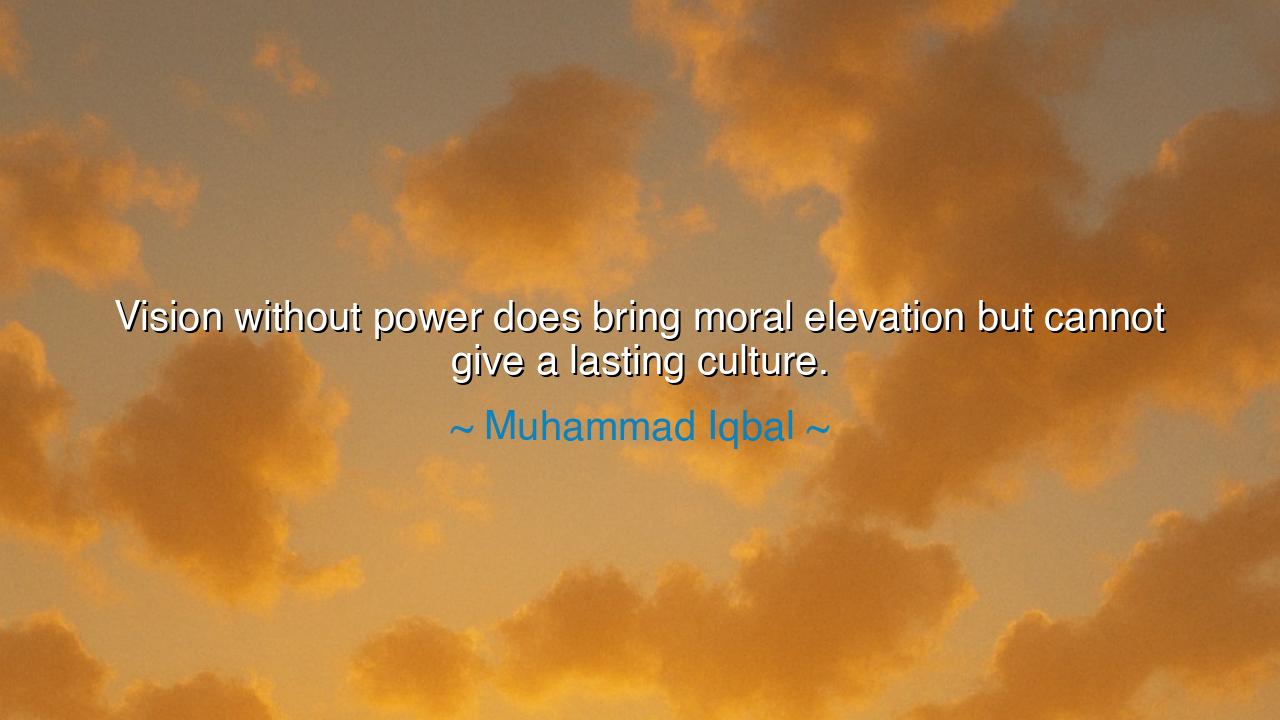
Vision without power does bring moral elevation but cannot give






The poet-philosopher Muhammad Iqbal, in his wisdom, declared: “Vision without power does bring moral elevation but cannot give a lasting culture.” These words echo like thunder across the valleys of time. A vision is like the star that guides the weary traveler through the desert night. It uplifts the soul, purifies the heart, and draws men closer to the divine. Yet if such vision is not joined with power, it remains but a dream, fragile and fleeting, unable to mold the destiny of nations or shape the structure of civilizations.
Consider the fate of noble dreamers who spoke of truth but lacked the strength to defend it. Many prophets, sages, and reformers stirred the conscience of humanity, and though their words lit fires of moral elevation, the flames often died when not guarded by the shield of organized power. For vision alone is a seed; without soil, rain, and the hand of the gardener, it cannot grow into the tree that shelters generations.
Look upon the story of Al-Andalus, where scholars, poets, and philosophers adorned the land with vision. Cordoba shone as a lamp of knowledge, its libraries vast, its sciences advanced. But when the power to defend that vision waned, the culture crumbled under the weight of foreign conquest. The moral light was there, radiant as the sun, yet without power it could not endure. Thus Iqbal’s words ring true: vision inspired, but power neglected, and culture was lost.
And yet, where vision and power walk hand in hand, the world is transformed. Recall the tale of the Prophet Muhammad, who began in the silence of a cave with a vision from on high. His message elevated hearts, but it was through the building of a community, the wielding of just authority, and the strength of unity that the vision gave birth to a lasting culture, enduring for centuries, shaping law, art, and civilization.
Therefore, O seeker of truth, know this: vision without power is like a soaring bird with broken wings. It may ascend for a moment, but it cannot remain in the sky. Power without vision is but tyranny, blind and destructive. But when vision is clothed in power, it becomes destiny, weaving together the spiritual and the material, the dream and the deed, the heart and the hand. This is the teaching of Iqbal, a fire for the young, a wisdom for the old, a call for all ages.






NDViet Nguyen Duc
Iqbal’s observation feels incredibly relevant today, especially when so many movements focus on awareness but struggle to create long-term systems of change. It makes me question whether we overvalue symbolism and undervalue strategy. Can a culture truly evolve on moral awakening alone, or does it need disciplined organization, resources, and leadership to endure? Perhaps wisdom lies in uniting moral purpose with practical strength.
KAkim anh
This statement makes me reflect on how often humanity romanticizes visionaries but overlooks the practical structures that keep their legacies alive. Without power—whether in institutions, education, or leadership—even the most profound moral ideas can disappear. But how do we ensure that power serves vision rather than corrupts it? It’s such a delicate balance—too much power crushes ideals; too little leaves them powerless.
XPxinhxinhne plinh
I love how this quote bridges philosophy and politics. It challenges the idea that goodness alone can sustain a culture. It makes me wonder whether societies fail not because they lack ethics, but because they lack the strength to defend or institutionalize those ethics. Maybe power isn’t the enemy of virtue after all—perhaps it’s the mechanism that allows virtue to survive across generations.
HHhuy hoang
This quote feels like a critique of passive idealism. It suggests that moral elevation without power is fragile—something that can inspire briefly but not sustain a civilization. I can’t help but think of social movements that began with passion and purpose but dissolved without structure or authority. Is Iqbal implying that power itself isn’t corrupting if used wisely, that it’s actually a moral necessity for preservation?
TQTran Thanh Quang
I find this statement both inspiring and sobering. It acknowledges the beauty of vision but reminds us that good intentions aren’t enough to build enduring change. I wonder how Iqbal would define ‘power’ in this context—does he mean political power, economic influence, or inner strength of will? Maybe lasting culture requires a balance: moral vision to guide direction, and power to make it tangible in the real world.